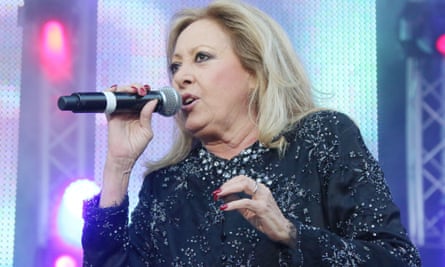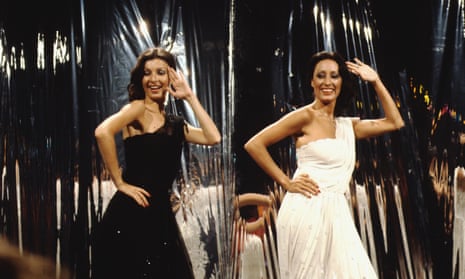The mysterious power of pop music knows no bounds. After Scotland’s footballers beat Serbia in a penalty shoot-out in November 2020, thus qualifying for Euro 2020, a video clip of the players celebrating by singing Baccara’s 1977 international disco hit Yes Sir, I Can Boogie went viral.
The fusion of European football and the Spanish disco duo even prompted some delirious Scottish remainers to see this as a symbolic step on Scotland’s road back to European Union membership.
On its original release, Yes Sir, I Can Boogie topped charts in the UK and across Europe and stands as the bestselling single of all time by a female group, with 18m copies sold. Last year’s 91st-minute hurrah fired it back into the UK Top 40.
“I never thought I would be in the charts again. I am not young any more but I guess it shows I can still boogie,” said Baccara’s founder member María Mendiola, who has died aged 69. “The Scotland team has reminded people we exist, which is very nice.”
Yes Sir … was Baccara’s first single and they could not repeat its phenomenal success, but the follow-up, Sorry, I’m a Lady, also topped several European charts and reached No 8 in the UK. Mad in Madrid was their entry in the World Popular Song festival in November 1977, at which Baccara represented West Germany, and brought them further European chart success.

Their debut album, Baccara, entered the UK Top 30 and went down especially well in Scandinavia, reaching double platinum status in Finland. The second album, Light My Fire (1978), was a damp squib by comparison, though the loyal Finns once again sent it to the top of their national chart.
In fine pan-European style, the album contained Parlez-Vous Francais?, which became Luxembourg’s entry in the 1978 Eurovision song contest. The song’s flirtatiously camp account of a summer holiday romance perfectly mirrored Baccara’s image as the embodiment of sun-sex- and-sangria Euro-hedonism.
Regular appearances on Sacha Distel’s television show brought Baccara into millions of British living rooms, while German viewers saw them frequently on Musikladen. However, their fourth album, Bad Boys (1981), marked the end for the original Baccara pairing of Mendiola and Mayte Mateos.
Not only was the disco boom waning, but they had fallen out over which vocal mix should be used on the single Sleepy-Time-Toy, Mendiola objecting that her voice had been been pushed into the background. Their contract with RCA was not renewed and they each pursued a solo career.
Mendiola was born in Madrid, and started as a dancer, which led to her becoming prima ballerina of Alberto Portillo’s Spanish TV ballet, appearing in regular broadcasts. In 1976 she proposed to Mateos, a former ballerina and another member of the Portillo company, that they form a song-and-dance duo, which they called Venus.
They secured a booking at a nightclub in Zaragoza, but were fired after the club manager deemed them “too elegant” for the job, which apparently meant that they declined to give lapdances to customers. The duo then headed to Fuerteventura in the Canary Islands, where they secured a hotel booking performing flamenco dance and Spanish songs.
It was here that they were spotted by Leon Deane, who ran RCA Records in Germany. Shrewdly detecting their potential, he flew them to Hamburg and set about creating the blueprint for Baccara, from stage performances to their whispery, suggestive vocals and instrumental arrangements. Baccara means black rose in Spanish, and was inspired by the performers’ Hispanic looks. Deane’s plan was to mix Spanish influences with the ubiquitous disco sound. The stage was set for the creation of Yes Sir, I Can Boogie.
After parting company with Mateos, Mendiola formed New Baccara with Marisa Pérez – Mateos had cornered the “Baccara” name, though Mendiola later reclaimed it – and hit the German and Spanish charts with the single Call Me Up. They then enjoyed a string of club hits including Fantasy Boy and a version of the Bette Midler hit Wind Beneath My Wings. In 2008 Pérez, suffering from polyarthritis, was replaced by Mendiola’s niece Laura, and then by Cristina Sevilla.
Earlier this year, the Glasgow band the Fratellis recorded a version of Yes Sir, I Can Boogie to benefit three children’s charities, but Mendiola was not enthusiastic. “My honest opinion is it is not my cup of tea,” she told the Scotsman. “I do not like it.”
She is survived by her husband, Jan Erick Olsson, a son and three grandchildren.
María Mendiola, dancer and singer, born 4 April 1952; died 11 September 2021

Comments (…)
Sign in or create your Guardian account to join the discussion